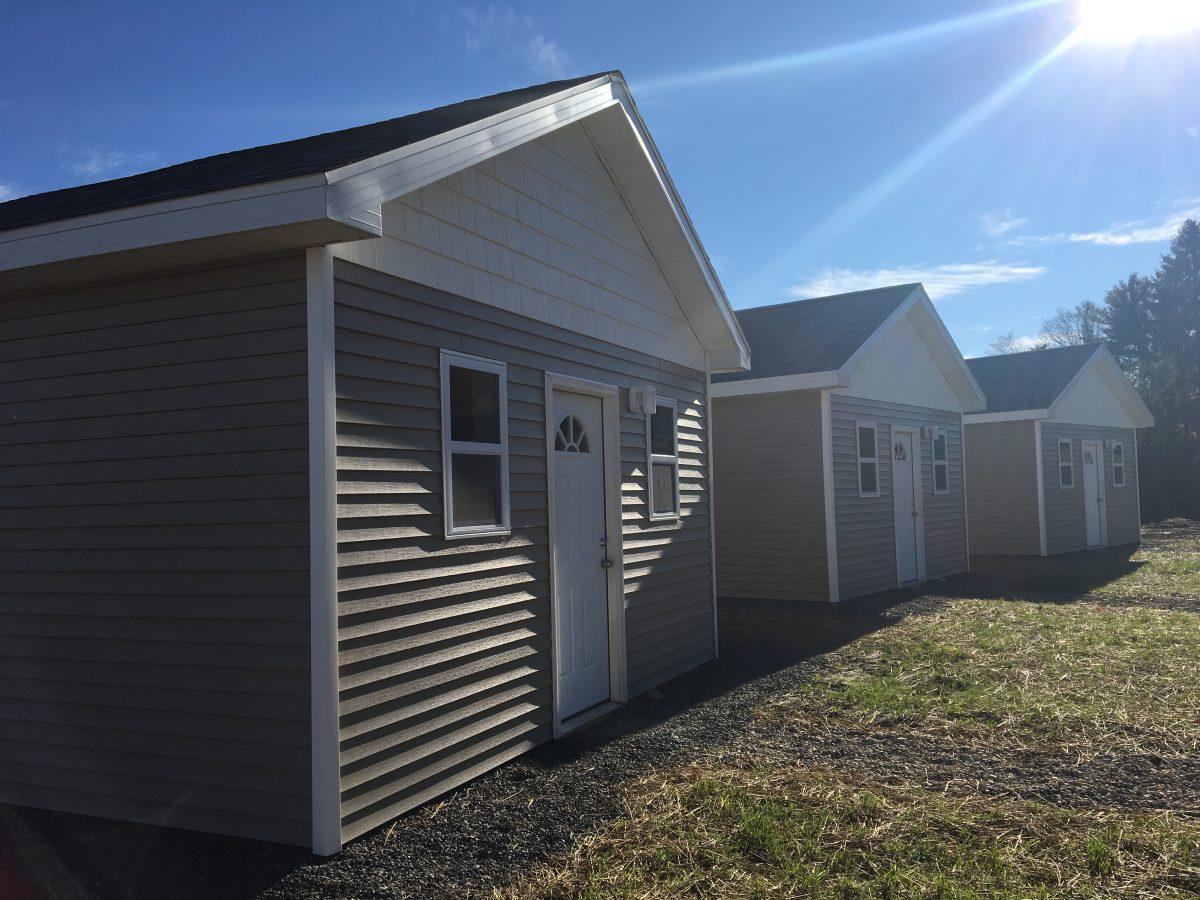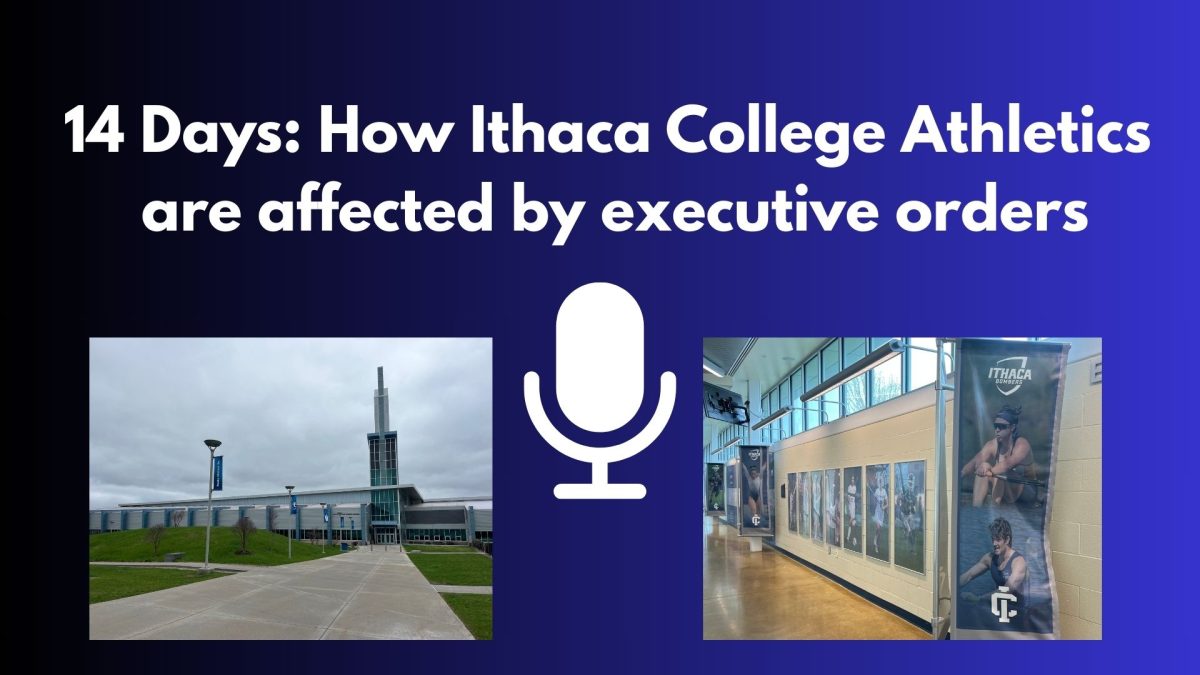Carmen Guidi, owner of Second Wind Cottages, sits at a conference table with two other colleagues. Second Wind is a private business that houses people in small cottages built by volunteers. The mission: allocate four small houses to four homeless people. The problem: Guidi has almost 40 candidates applying but only four homes available.
“We started with 37, 38 names, something like that,” Guidi said. “We’ve got it narrowed down to 18 or 19 names. Now we’ve got to do the hard work of selecting from that.”
Across town, Richard Bennett sits in a tiny office overlooking West State Street. As director of Ithaca’s Rescue Mission, he provides emergency housing and a safe space for the homeless in Ithaca. According to Bennett, Ithaca is the eighth-most expensive place to live in the country with a vacancy rate of 0.5 percent.
“We have a waiting list at our shelter right now — and I don’t say that with any pride,” Bennett said. “It’s a ludicrous reality that you have an emergency service that you don’t have enough resources to fill — it’s crazy.”

In Jan. 2015, 564,708 people in the U.S. were homeless on a given night. In Tompkins County, 1,629 bednights were provided in Jan. 2015 — 1,629 people were housed in Tompkins County for at least one night when the population sits at 104,926.
With a low vacancy rate and high living expenses, acquiring a home in Ithaca is challenging. Resources are scarce and private companies such as Second Wind Cottages and nonprofits like the Rescue Mission are a huge crutch for the homeless community.

The outside of Ithaca’s Rescue Mission. The Rescue Mission is an emergency housing service for homeless Ithacans.
“If you think about the numbers we see coming through our doors, we probably need somewhere between 60 and 100 additional units of permanent, low barrier, supportive safe housing in this community,” Bennett said.
However, local organizations are not alone in their fight to end homelessness. The federal, state and local governments have implemented policy and regulations to combat the issue. In total, there are about four major implemented plans designed specifically to mitigate homelessness within communities.
On the federal level, one initiative has been passed in an attempt to give resources to local communities to assist in ending homelessness. In 1987, the McKinney-Vento Homeless Assistance Act was passed.
According to the National Coalition for the Homeless, the McKinney-Vento Act, “was the first — and remains the only — major federal legislative response to homelessness.”
The Act created 15 different programs, ranging from emergency shelter programs to educational programs, that attempted to help the American homeless population regain stability.
However, despite the federal effort and the decreasing national homeless population, New York still has one of the highest shares of the homeless population nationwide.
Recognizing this problem, New York Gov. Andrew Cuomo issued Executive Order 151 to help keep homeless people safe throughout the winter. The order, which went into effect Jan. 5, 2016, states that communities are expected to provide shelter for homeless individuals during below-freezing temperatures.
“Homelessness is an issue that impacts citizens in all regions of the State, from large cities to small towns and rural communities… Certain parts of the State are facing a crisis of homelessness unprecedented in recent history,” the order reads.
On the local level, the City of Ithaca has implemented plans to help assist homeless people of all ages. The plans, put together by a combination of public, private, and nonprofit partners, emphasizes the need to work with the homeless through communication and community building instead of a purely governmental approach.

Cottages built by Second Wind. The homes are behind Guidi’s automotive service on Route 13 in Newfield.
One of the plans, the Continuum of Care Plan to End Homelessness, says that to end homelessness in Ithaca, conversations with governmental figures, the public and the homeless populations are a must.
“No one should experience homelessness,” the plan’s vision reads. “No one should be without a safe, stable place to call home.”
Yet, some people are unsure if these initiatives are enough. Guidi said the government assistance programs are challenging for private businesses to take advantage of.
“[The government] could make it easier for us to access funds to do what we are doing,” Guidi said. “You know, we really scrape and beg and plead with people and, you know, if there were more funds, we could do more.”
Chuck Newman, who is on the Board of Directors for Second Wind Cottages, also thinks that the government could be doing more to address specific problems within various communities.
“I think the government could help with the process to create more housing,” Newman said. “In our area, housing is the problem.”
Newman said that since Ithaca’s housing crisis is so large, it makes it difficult for low-income people to find an apartment, let alone, pay for it.
Alternatively, Bennett, believes that the community is the solution to the homeless problem in Ithaca. However, Bennett said he is not trying to let the government off the hook. He believes that local government has to balance the needs of everyone, and sometimes, certain issues like homelessness are left to the wayside.
“I just don’t think it is a government problem, I think it is a we problem,” Bennett said. “I think that as a community, there are enough resources in this community that if we decided that homelessness was unacceptable, we could end it.”

Bennett and Guidi said the government must continue to help in ending homelessness. Both men agree that continued community effort and work is necessary in Ithaca so that one day, homelessness will be a thing of the past.
Fighting homelessness helps bring the community together, said Ed Woods, a volunteer at the Rescue Mission. Woods started working with the homeless because he had spare time and knew they needed help. He assists in the food pantry at the Mission.
“Families come through, there may be four or five in a family, and they give me a sheet,” Woods said. “This tells me how many are in a family and, based on how many are in a family, it tells me how much food they can take.”
Continued effort from local organizations will help lessen the homelessness problem in Ithaca. But the organizations need continued support from the government in order to accomplish their goals.
“There’s always this process that goes along with change,” Bennett said. “There’s always an ongoing process.”

Toys in Ithaca’s Rescue mission are askew in the playroom. Homeless families are given a space to play with donated toys.

The food pantry at Ithaca’s Rescue mission provides groceries for the homeless. Most of the food is donated from Ithaca’s Aldi and from individuals.













